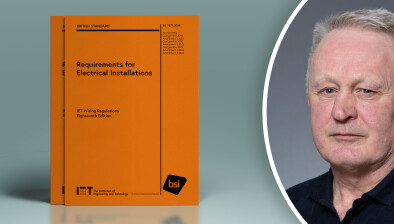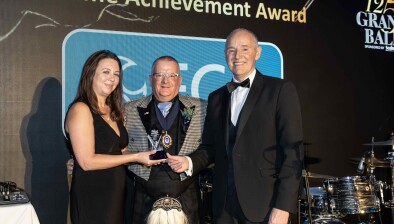Construction industry needs ‘certainty and momentum’ to meet low-carbon challenge
The managing director of Scotland’s largest construction trade association has said “certainty and momentum” are the key ingredients if the industry is to successfully build on the outcome of the upcoming COP26 summit.

Alan Wilson
Alan Wilson from SELECT says it’s essential for the good work to continue after world leaders have left the UN Climate Change Conference in Glasgow on November 12.
Speaking at this week’s Building to COP26 webinar, hosted by the Construction Scotland Innovation Centre (CSIC), he said: “As a sector, we’re very excited to move into this next phase of industry development but there are two key words, which we need to hear and embrace: certainty and momentum.
“The industry needs to know its clear direction of travel and to be given bite-sized chunks of information to help it stay on course. And it also needs to keep pace with any promises made, so we can’t have COP26, and then say, ‘Wasn’t that jolly good?’ and all go back to our day jobs as if nothing has changed.
“The sector has been discussing this kind of work for many, many years and there have been several false dawns. But we’re past that now and need to move forward to the next stage.”
Commenting as one of several guest speakers at this week’s event, Mr Wilson also said that the electrical industry will play “an integral part of all our lives” in the future.
He told online delegates: “We’ve said for many years that the future is electric, but I think we can say ‘the now is electric’ because electrification is already starting to drive our heat, light and transport demands.
“It’s therefore vital that we have investment in the sector; we currently have a good workforce, with a record number of apprentices recruited so far this year, but an element of upskilling is definitely necessary to help make our sector more agile when it comes different kinds of installations.
“For example, we’re probably all aware of tried-and-tested innovations like photovoltaic panels, battery storage and electric vehicle (EV) chargers, which the industry is already installing in homes and offices across the country.
“But we’re also keen to get involved in ‘prosumer’ activity, where individual houses, groups of houses or even shopping centres etc can effectively come together, take themselves off grid and generate their own electricity, whether that’s wind, solar or a mix of both.”
As an example of innovative thinking, Mr Wilson highlighted the work done by Nissan, which is using retired EV batteries to provide back-up power to the Amsterdam Arena in the Netherlands.
He said: “This kind of thing isn’t rocket science per se, but it’s here, it’s now and it’s happening, and we need to grab such opportunities, take advantage of them and make them work for us.
“There are lots of similar opportunities in the electrical industry and we are very excited to be part of a sector which is going to be an integral part of all our lives going forward.”
Hosted by Stephen Good, CEO of CSIC, the webinar on September 7 discussed the opportunities that COP26 presents industry to accelerate to zero carbon.
Other speakers included Peter Reekie, chief executive of Scottish Futures Trust and the Scottish Construction Leadership Forum, Sean Smith, chair of the infrastructure and environment group SRPe, Lynne Sullivan, architect and national built environment strategic advisor, and Professor Steve Petrie, business performance director at Balfour Beatty.
Ivan McKee, minister for business, trade, tourism and enterprise, also delivered the opening address, giving an overview of what COP26 means for the Scottish built environment.
Topics discussed by the panel included the commitment of the public sector and industry to driving green growth, and using Scotland’s resources, circular materials and manufacturing capability to solve supply chain issues.
It also discussed some of the innovative and impactful approaches to transforming Scotland’s built environment and how Scotland can develop a skilled and competent workforce capable of delivering zero carbon ambitions.
During the session, Mr Wilson also highlighted the ongoing work of the Construction Industry Coronavirus Forum, which is looking at energy efficiency and low-carbon targets as part of its ongoing mission to help the industry.
He said the Forum has been exploring options from “the shop floor perspective” and is keen to find joined-up solutions to assist the designers, suppliers and installers of new technology.
Mr Wilson – who chairs the unique collective – said: “The Forum’s energy efficiency group is already considering plans for an annual low-carbon festival, to be held as part of the Edinburgh Festival, which would integrate everyone in the sector and would help tick the box around momentum.”

















